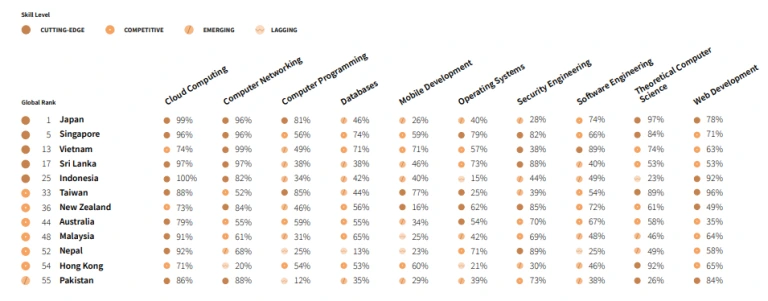Key takeaway
- Salaries Vary Widely: US ($70K – $100K), EU ($50K – $100K), India ($7K – $20K), Vietnam ($6K – $15K).
- Main Drivers of Salary: Platform (Power Apps, OutSystems), experience, location
- Offshore Savings: Vietnam, India can cut costs by up to 70%
- 2025 Trend: AI tools are reducing developer rates—but boosting productivity significantly
The market demand for low-code developer
According to Future Market Insights’ recent forecast, the global market for low-code development technologies will reach $260 billion in the next 10 years. The expanding roles of business technologists and the growing adoption of enterprise-wide hyper-automation are the primary factors propelling low-code technology adoption through 2026.
Why do companies progressively adopt low-code?
- They want to tackle the gap between the burgeoning demand for digital transformation and the lack of tech talents. Organizations can unlock this agility by equipping IT professionals and non-IT personnel with low-code tools.
- The need for customization. Off-the-shells software works wonders but often lacks domain expertise.
- Most businesses want to craft their specialized solutions, but not all have the resources to do so. In this case, low-code is more cost-effective. It cuts down the time from lengthy development and, thus, reduces the need for professional developers.
- Organizations also invest in low-code technologies that foster innovation and composable integration as they adopt the composable enterprise model.
However, this doesn’t mean professional developers will lose their job to low-code. Even though low-code is accessible to anybody, basic coding knowledge is still a huge plus to leverage this technology up to its potential. And this, of course, highlights the surging demand for low-code developers.
Due to this trend, developers are increasingly incorporating low-code platforms into their skill sets to meet the rising demand for software and tackle the IT backlog. 84% developers agree that learning low-code helps them achieve their career goals faster.
Learn the future of low-code and how you can be adaptive to the trend (For business owners & developers)
What skills to look for in a low-code developer?

When hiring a low-code developer, it is essential to identify the right skills and expertise to ensure the success of your development projects and estimate a low-code developer salary. Let’s take a look:
- Familiarity with one to a few low-code and no code platforms (that’s why they are called low-code developers).
- Strong programming knowledge: Despite the primary focus on low-code development, a competent developer should possess a solid background in programming languages, including Java, JavaScript, HTML5, C++, .Net, and C#. This foundational knowledge enables them to customize applications to suit specific requirements.
- Understand simple UI/UX principles.
- Knowledge of database management: They are responsible for creating, maintaining, and optimizing databases for the applications they build.
- Strong problem-solving skills: An exceptional low-code developer should be able to identify and resolve issues that may arise during the development process.
- Effective communication and teamwork skills: Low-code developers frequently collaborate with business users who don’t have a technical background. As such, they must exhibit strong communication and teamwork skills to share ideas, gather feedback, and maintain alignment throughout development. It will be a plus if they have experience working in cross-functional teams or with stakeholders from different backgrounds.
- A responsible developer ensures that the project runs smoothly, and issues are addressed promptly, ultimately contributing to the project’s success.
How much do low-code developers make around the World?
In one year, 37% of low-code developers have increased their salaries from 5% to 10%, while only 26% of traditional coders experienced this. This doesn’t mean low-code developers will earn more than others, primarily due to the gap between demand and supply. Low-code is trending. It might take a few years to see the career opportunities in this niche domain.
Salaries for low-code developers vary significantly worldwide. In the US, the average annual salary ranges from $70,000 to $100,000, while in countries like Vietnam, it’s around $15,000. Platforms like Power Apps and Mendix also impact pay. This guide offers a comprehensive comparison to help businesses make smart hiring decisions—whether locally or offshore.
Let’s take a look at the low-code developer salary in India, UK, US and other regions.
| Location | Average salary |
|---|---|
| USA | $70,000 to $100,000 |
| United Kingdom | $50,000 to $90,000 |
| Canada | $40,000 to $80,000 |
| Australia | Around $35,000 |
| Germany | $55,000 to $90,000 |
| Netherlands | $65,000 to $80,000 |
| Belgium | $30,000 to $40,000 |
| India | $7,000 to $20,000 |
| Hong Kong | Around $40,000 |
| Singapore | $40,000 to $70,000 |
| Vietnam | $6,000 to $15,000 |
As you can see, the US and Europe regions are leading the low-code engineer salary chart. Yet, this doesn’t indicate the quality of services or developers’ expertise. The gap between each region is caused by differences in living standards and the worth of currency. Because of this, many companies opt for offshore outsourcing instead of onshore to save resources and balance their finances.
Some of our guides to help you navigate IT Outsourcing:
- In-house vs Outsourcing Software Development: Best Guide For 2025
- IT Outsourcing Models: Comparing How Each Impact Outcomes (Onshore vs Offshore)
Vietnam, India, China, Japan, and Singapore are the top-voted countries for Low-code Development and Software Development.

There are many ways to hire a low code developer:
- Post your Job description and wait for an application on Job posting websites such as Indeed, LinkedIn, or any popular web in your region. This works best if you are looking for a full-time and long-term contract developer.
- Look for reviews and references on Clutch, G2, and Goodfirms for a development partner if you want to outsource or don’t have a qualified in-house team to do the project.
- Go for Upwork, Fiverr, and other freelancing websites for a short-term developer. It’s best to hire someone for a simple and quick task.
Which Platforms Pay Top Salaries—Power Apps, OutSystems, Mendix?
Low-code developer compensation varies significantly depending on platform (Power Apps, OutSystems, Mendix), experience level, and location. Below is a comprehensive breakdown to help hiring managers and developers benchmark salaries accurately.
Salary by Platform & Experience Level
| Platform | Level | US Salary (USD/year) | Global Avg (USD/year) | Notes |
|---|---|---|---|---|
| Power Apps | Junior (0–2 yrs) | $70,000–$85,000 | $35,000–$50,000 | High demand in enterprise, easy onboarding with Microsoft stack |
| Mid (2–5 yrs) | $85,000–$100,000 | $50,000–$70,000 | Microsoft certification boosts value (PL-100, PL-400) | |
| Senior (5+ yrs) | $110,000–$130,000 | $70,000–$90,000 | Often combined with Azure & Power BI skills | |
| OutSystems | Junior | $65,000–$80,000 | $30,000–$45,000 | Portugal, Brazil, India have strong pools of junior talent |
| Mid | $80,000–$95,000 | $45,000–$65,000 | Certified developers earn 10–20% more | |
| Senior | $100,000–$120,000 | $65,000–$85,000 | Enterprise architecture and UX/UI knowledge preferred | |
| Mendix | Junior | $60,000–$75,000 | $28,000–$40,000 | Most active in Europe (NL, DE, UK) |
| Mid | $75,000–$90,000 | $45,000–$60,000 | Skills in Java + Mendix = higher pay | |
| Senior | $95,000–$115,000 | $60,000–$80,000 | Architecture design, API integration raise salaries |
Quick Comparison: Top Earners by Platform & Region
| Platform | Highest Paying Region | Top Salary Range |
|---|---|---|
| Power Apps | US, UK, Australia | $110K–$130K |
| OutSystems | US, Switzerland, Germany | $100K–$120K |
| Mendix | Netherlands, Germany, US | $95K–$115K |
Career Growth Trends in 2025
| Factor | Power Apps | OutSystems | Mendix |
|---|---|---|---|
| Entry-level learning curve | Low | Medium | Medium |
| Enterprise demand | Very High | High | Moderate |
| Community & documentation | Very strong (Microsoft) | Good | Moderate |
| Cross-platform integration (AI, cloud) | Excellent with Azure | Strong with DevOps | Good with Java |
Hiring Tip: For budget-conscious hiring, you can find highly capable mid-level Power Apps or OutSystems developers in Vietnam, India, or Brazil for ~$25,000–$45,000/year, while still maintaining quality through certifications and trial projects.
Developer Tip: To increase your market value, combine platform-specific skills (like PL-400 for Power Platform or OutSystems Reactive Web) with general DevOps, cloud, or API integration experience.
Why are offshore rates lower – and what are the trade‑offs?
Offshore low-code developer rates are significantly lower due to several economic and market-driven factors:
Why Offshore Is Cheaper:
- Labor Cost Disparity: Countries like Vietnam, India, and the Philippines have a lower cost of living, which reflects in developer wages. A senior low-code developer in Vietnam might earn $20,000/yea r- compared to $100,000 in the US.
- Talent Pool Saturation: Some offshore markets are highly competitive, with many developers specializing in low-code platforms. This drives prices down.
- Government Investment: Nations like Vietnam and India have invested in IT education and outsourcing infrastructure, which supports large-scale offshore delivery at lower prices.
- Currency Advantages: Exchange rate differences benefit companies hiring offshore, especially when paying in USD or EUR.
Trade-Offs to Consider:
| Trade-off | Offshore Challenge | Solution/Tips |
|---|---|---|
| Time zone differences | May delay communication or approvals | Use overlap hours, async tools, or nearshore |
| Quality consistency | Not all offshore vendors meet top standards | Vet portfolios, ask for trial projects |
| Project alignment issues | Cultural gaps or unclear expectations | Use clear documentation and regular check-ins |
| Legal & IP risks | Varies by country and contract clarity | Ensure strong NDAs and enforceable agreements |
Conclusion: Offshore low-code development offers massive cost savings but requires strong project management, clear communication, and vendor vetting to deliver long-term value.
Why choose Vietnamese low-code talent?
As mentioned, Vietnam is currently the emerging region for software development (top 3 fastest growing of Asia). That said, we have pools of developers specialized in low-code, ensuring good code quality and satisfied services.
This isn’t the only reason why you should work with Vietnamese Low-code Companies, but also:
- Their low-code developer salary is more reasonable compared to others.
- They are familiar with all low-code platforms.
- High-quality services since Vietnamese developers are responsible, hard-working, and have a great growth mindset (as their culture teaches them so).
- Political stability should also be considered. You might want to work with a partner that has a stable and peaceful environment long-term. And Vietnam has the highest score of political stability in Asia and a low rate of terrorism threat.
Working with Synodus for your low-code development
Synodus is the leading Custom Low-code Development Company in Vietnam and APAC. We are the certified partner of Microsoft PowerApps, Nuclent, Salesforce, and Sitecore for low-code consultation and development.
With 250+ well-versed developers, we offer development solutions with scalability across the spectrum, from startups to enterprises, to best serve your digital transformation. Our low-code services range from Custom Web/ Mobile App Development, Internal Tools Development, Process Automation, Cloud Development to Legacy Modernization.
Striving to become your next strategic partner, our team closely guides you through every stage of development and beyond. Transparent communication, in-depth consultation, and seamless execution are the keys to our project’s success. View our portfolio!
Wrapping up
In summary, the growing demand for low-code development highlights the need for skilled low-code developers. Invest in the right talent and unlock the full potential of low-code development for your organization. We hope our detailed guide on low-code developer salary, and skillsets can help you choose the best strategy for your organization.
More related posts from Low-code blog you shouldn’t skip:
- 5 Top-notch Low-code Development Companies in Vietnam
- 10 Best Low-code Development Companies In USA To Hire
- 8 Low-code Development Companies In Europe To Work With
- Golden List: Best 8 Low-code Development Companies In Asia
- 10 Best Low-code Development Companies in India to Hire
How useful was this post?
Click on a star to rate it!
Average rating / 5. Vote count:
No votes so far! Be the first to rate this post.




